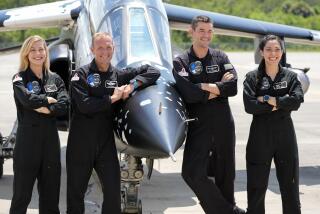Faulty Cooling System Delays Columbia Launch
- Share via
KENNEDY SPACE CENTER, Fla. — The shuttle Columbia’s planned launch next week on a Spacelab astronomy flight will be delayed “two to three weeks” because of work to replace a balky cooling system valve, NASA officials said Wednesday.
The launch delay was announced by William Lenoir, associate administrator for space flight, at the conclusion of a two-day flight readiness review. Liftoff for the 36th shuttle flight had been scheduled for next Thursday.
“We are obviously disappointed that we are not ready to fly,” Lenoir said. “However, this particular system is absolutely critical to the safety of the crew and overall mission success, so we have decided to change the component.”
NASA Administrator Richard H. Truly said his only concern was making sure the shuttle is safe for flight.
“Nobody remembers the century that Galileo looked at the planet Jupiter (and) nobody’s going to care whether we fly on a Tuesday or Thursday. I look at this mission the same way,” he said.
A preliminary repair schedule showed that Columbia would not be ready for blastoff until at least May 30, two weeks later than planned.
“I think it’s going to take two to three weeks,” launch director Robert Sieck said. “This is straight-forward work but it is tedious; it has a high degree of difficulty.”
The problem is one of access. Engineers have never attempted such a repair job inside the shuttle’s 60-foot payload bay with the spaceplane in the vertical launch position.
The postponement poses a major threat to Columbia’s next mission, a Spacelab flight set for launch in late August, because of an already-tight processing schedule and a high-priority flight Oct. 5 to launch a European probe to Jupiter and the sun.
Columbia and its seven-member crew are to study X-ray and ultraviolet radiation from deep space that is blocked by Earth’s atmosphere.
Astronomers say the mission will provide new information about the physical makeup of the universe.
Columbia’s crew--in what will probably be a post-Challenger record--plans to spend at least nine and possibly 10 days in orbit to study the high-energy astronomical targets.
More to Read
Sign up for Essential California
The most important California stories and recommendations in your inbox every morning.
You may occasionally receive promotional content from the Los Angeles Times.












